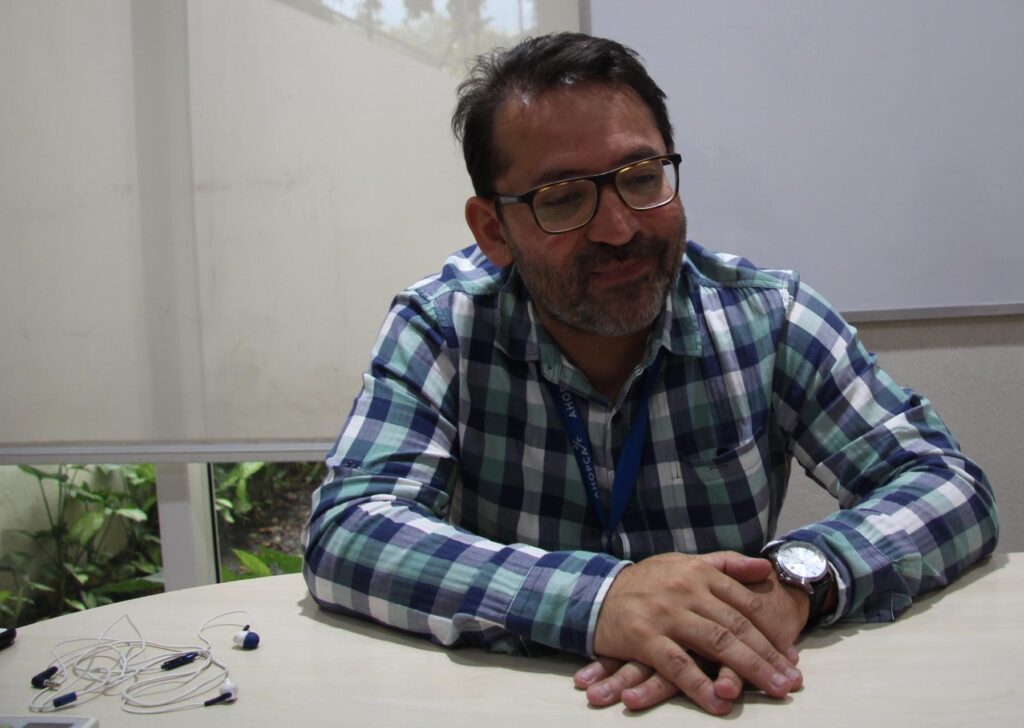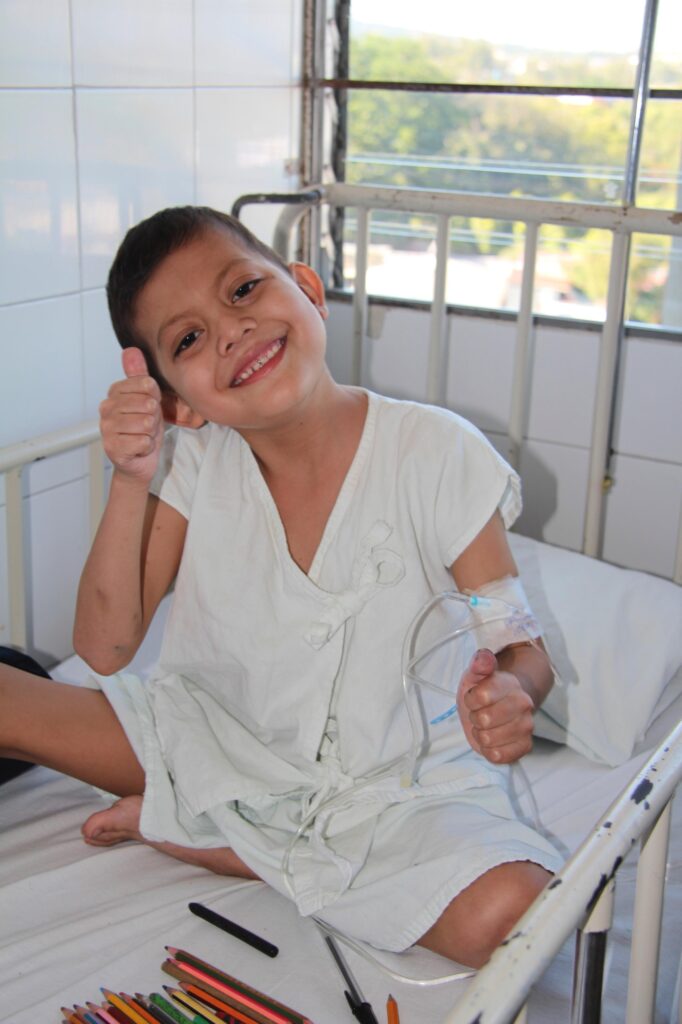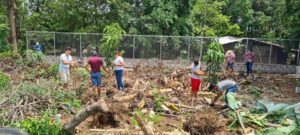Esta historia se escribe en Español = This story is also written in Spanish here
“These kids give us a chance to learn.”
Three of us are standing along a curb by one of the city’s clinics respectfully waiting while a mom carefully transfers her medically fragile child into a van. We are told there is no ambulance to transport the children. After they leave, we need to show our ID to the armed guard in order to receive a visitor’s pass into the facility.
Within the city is a gem of a place for sick children called the Benjamin Bloom Children’s Hospital. And within that facility is the pediatric oncology section. It is here that at any given moment during any given night or day of the week Dr. Roberto Vasquez is moving among the halls of its clinic, hospital, or classroom. He has served as its chief of pediatric oncology here for the past twelve years (as of this interview.)
Dr. Vasquez greeted my partner, our friend who set up the interview, and me for the interview and escorted us from the waiting area of the downtown oncology clinic into a small conference room. To our surprise he spoke fluent English. “I have the most important job in the world,” a smiling Dr. Vasquez proudly began. My first impression of this soft-spoken man was approachable and gracious.
“I LOVE the clinic!” Dr. Vasquez enthusiastically announced. “The patients – they open your heart.” It is here in this location that he first meets the children and their families. It is here in this location that he and his dedicated staff begin diagnostic testing to determine their individual courses of treatment. It is here that he begins to form relationships with the children (his patients) and their families. We note their anxious faces in the waiting area doing exactly that – waiting to be diagnosed and to interact with this doctor they undoubtedly have heard so much about. “I have the most important job in the world. Pediatrics is fantastic, and pediatric oncology is like heaven! That kind of patient is completely different from any other patient I have worked with in my medical career,” Dr. Vasquez shares. His words are genuine and heartfelt.

“Every single day I wake up believing every human being has the same rights. I am convinced that whether this a patient in Africa or London or the States, these kids here have the same rights as kids everywhere. In order to work here our staff has to believe that we can take care of all our patients whether they are Salvadorans, Hondurans, or Guatemalans. They all deserve the same chance to be cured as any child living anywhere else in the world.”
“We see a wide range of families whose situations vary in terms of their economic levels, opportunities, and educations.” He explains that many of his patients are from very poor families living in tiny villages throughout Central America without resources or options. A mother may travel for a month without food or sleep in order to save her child. Often these mothers have neither formal education nor knowledge of how to care for their child but do so based solely on their love and devotion for their child. These families inspire Dr. Vasquez. “They are the most amazing people I witness. “As I am listening to him, I find myself mentally adding all the synonyms for compassionate to my list of adjectives to describe Dr. Vasquez.
My partner and I had to inquire about his own family and who recognized his special abilities and talents to encourage him into this field. He shared that his family is middle class with a very high work ethic. Education was fundamental to their thinking for their three children. “I HAD to work and I HAD to study. We have to change the world by studying hard,” Dr. Vasquez reports was his parents’ philosophy. They both lived it by being role models. Even now in their 80’s both parents continue working by running a small convenience store out of their home. After first attending public school as a young boy, a teacher then took him to a private Jesuit school to take exams where he earned a nearly full scholarship; he paid only 13 colones (equivalent of $1) a month to attend through high school. Next came National University followed by a residency at the National Hospital. His boss found scholarship money to send him to study in Italy. “I think it’s important to travel to other areas to improve and be a better person.” He is obviously quite intelligent and had people in his life who recognized his gifts from a young age and who were able to encourage him to develop those gifts.
We probe further as to why Dr. Vasquez chose oncology as a career path. His former boss “inspired me in science, but when you work in oncology, you work directly with patients. I fell in love with the patients with chronic disease.” He goes on to explain that as doctors going through their rounds of training in the various departments, such as ER, they tend to treat a patient and move on to the next one without getting to know that patient or his history. In oncology a doctor has a chance to learn about the patient’s history beyond the biological disease. He is able to learn about the social, emotional, and spiritual situation he is treating, the entire human more than simply science. This can be very complex.
The specific reason Dr. Vasquez chose pediatric oncology has to do with one specific patient at a pivotal point in his career. He always enjoyed data and research and was leaning toward traveling to Colombia to go into research with the Jesuits and to distance himself from patients after he completed his residency. THEN he met an 11-year-old girl. Not only was she his leukemia patient; she was a paraplegic with hydrocephalus. She had all these strikes against her, yet she was highly intelligent, happy, full of life. “She was amazing; she was a miracle. I formed a relationship with her. It was a transformative experience that changed my life.”
Being an oncology doctor requires forming relationships with patients and their families. That takes work and time, but it is important. Dr. Vasquez has to present information to the family that obviously differs from what he may have to tell the child depending on the situation or age of the child. “The kids are fantastic. They have to trust me so we can talk and be honest with one another. Kids are kids, and they may try to manipulate. I sometimes have to be firm like a parent and give them rules. My relationship with the family is different; it is a team relationship. I try to understand the family through my patients — the kids.”

Building a staff that is as dedicated to the oncology patients as is Dr. Vasquez takes time and care in recruitment. He credits the head of nursing in his department with being a very important position in finding not only hard workers but also those who are committed to the same values and belief that all kids deserve the same rights which he professes. He recognizes how hard those nurses work stating that in some countries the oncology nurse to patient ratio is 1:3 or 4. In his hospital it is closer to 1:9. The nurses are the ones who live with the patients every day. “They all recognize that we are the only place in all of Central America doing this work. There are families waiting to see us. We are the only chance they have. We need each other.” It is encouraging that Dr. Vasquez recognizes the strength of his team members.

Dr. Vasquez was unaware that a few years ago my partner and I had the privilege of visiting those patients in his oncology section of the Benjamin Bloom Hospital. I will never forget the nurses wearing balloon animal hats around the patients to brighten their days and make them laugh. We loved the colorful, cheerful classroom and interactive staff member in the classroom playing tea party with the little kids hooked up to their chemo-IVs. Those kids were having such a grand time just being kids playing out of their beds. I commented to him what a special, upbeat group of nurses they were and what a positive impression we had of them.

The staff at Benjamin Bloom oncology does not exist in isolation. St. Jude’s Hospital in the U.S. works very closely with the Bloom oncology unit. Working with St. Jude’s on the same goals to analyze data and improve protocols has been a great opportunity. Each day of the week they teleconference regarding cases of a specific type of cancer. Bloom also works together with a private foundation, an association of scientific partners in the States and throughout Central America, to share data and to centralize information. Dr. Vasquez sees these collaborations as vital to their success. “I must be an advocate for my patients; therefore, sometimes I am reluctant to get involved with agencies that I sense might jeopardize patient care.” He works in tandem with others in his field yet protects his patients when unclear of the motives.
Dr. Vasquez sees a bright future in the oncology unit at Benjamin Bloom Hospital. The oncology department is growing in staff and expertise. It has five (now nearly six) oncologists. “It is an incredible time to develop things here,” he observes. “I’d like to be able to offer bone marrow transplants soon. We don’t have that anywhere in our country.”
Dr. Vasquez is a progressive thinker with insightful and resourceful plans for his unit.
He also would like to see improvements in prognostic markers for all cancers which requires sophisticated labs. The benefit will be informing parents and staff of which groups require more or less chemotherapy and have the same results. “That would be fantastic because it would help us with the resources we need for each patient. With cancer, if you aren’t doing that, you aren’t providing the level of care the patient deserves.”
Bloom has a 65% -70% survival rate of its pediatric cancers; with Hodgkin’s it is saving 85%. “If you ask me the names of those patients we cured, I cannot recall. However, I do know the names of the ones we lost. It is that 35% we have to be oriented to. It is painful for me to recall them. Every time we analyze data we do better. We need more diagnostic tools to improve our abilities to find out more to offer better support to our patients. I would like to be more involved in research, but it is hard to do research while treating patients. “ Effective, successful, valuable are words that now come to mind in describing Dr. Vasquez’s skills.
“As a Roman Catholic, I don’t believe that faith and science contrast. I believe they can intersect. I once asked a priest that question, and his response made sense to me. ‘When you formulate the right questions, you will receive the right answers,’ he told me.
Doctors ultimately need to make the difficult decision to stop treatment rather than continue to cause pain and suffering if a child is not responding to treatment. Families cannot do this. Parents understand. Sometimes we have treated a child for ten years.
Childhood cancer appears to be based strictly on genetics and statistics. “The numbers are universal – 100 patients per million and so we see 200 in our population of two million. We treat new patients under the age of 15. If a patient was already treated here, has been in remission, and the cancer re-appears a couple of years later, we will treat that patient again. (We currently have a 21-year-old whose cancer was in remission at age 17 and recently flared up, for example.)”
Professionally I am able to attend seminars. I can take many through teleconferences. Leaving this place to attend others is difficult due to all my responsibilities here.
The third place to find Dr. Vasquez if he isn’t in the clinic or at the hospital is in a classroom. We don’t know how he manages to have the time, but he finds the time to teach a class of fifth-year pediatric medical students. He feels it is important that these soon-to-be pediatricians understand certain realities in their practices. “I teach them to use the knowledge from their textbooks to approach pediatrics as patients first and science second.” That includes things like the culture in which a patient lives, his rights, and reality.
He is both generous and sacrificial in terms of skills and bestowing his knowledge to others.
“These kids give us a chance to learn. Kids who are dying have taught me a lot. They are incredible.” Dr. Vasquez shares how one young dying patient composed a note to his mother asking her to send a favorite nurse a bouquet of flowers. Another left his pencil to a staff member. Another child gave Dr. Vasquez his dog. “I have no time for a dog but I now have a dog,“ he laughs.
At age 46 Dr. Vasquez recognizes that his energy level is beginning to wane. It was at its height between the ages of 35-45. Now he is beginning to delegate some responsibilities to other staff members. He sees many new members of his team with lots of energy and trusts his team . . . “who are incredible and who will do much better than me; they are like my kids.”
During the past twenty years Dr. Vasquez is pleased by the groups and institutions organizing to protect Salvadoran children’s rights. They are recognizing children’s needs to play and study rather than work. This societal change is accepted and important.
Overall Dr. Vasquez hopes his country will be able to use tax revenue to improve education for its citizens who live without many resources. He would like to see more have opportunities to attend universities, for example. “We have to invest our money in our people.” (When we told him that is one of our main ministries in the country, he was quite pleased.) He also points out that El Salvador has many people to be proud of including Saint Romero, who had high values. “We need to discover ourselves again and be proud of our people again.”
One of our follow-up ideas is to arrange for our scholarship student studying to be a doctor to shadow him for a day. She is young and can keep up with his pace. She can certainly benefit from his high work ethics.
The privilege to interview Dr. Vasquez in such a relaxed, unrushed setting was an unexpected occasion for us. He even asked if we wanted to return for a follow-up interview on another day. We didn’t want to take advantage of his schedule and declined. He is such a gift to his patients and families, to this hospital, to this city, to this country, to all of Central America.

Whether he is diagnosing young patients at the clinic, working with the foundation and St. Jude’s on improving diagnostic tools, treating patients with his positive staff members at the nearby hospital, interacting with them or their families, or teaching fifth-year pediatricians the non-textbook ins and outs of oncology, Dr. Vasquez is a beacon of hope to thousands in this gem of a place called Benjamin Bloom Children’s Hospital.


